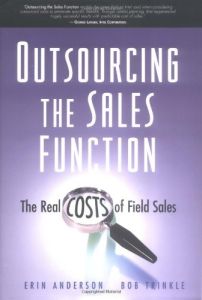Join getAbstract to access the summary!

Join getAbstract to access the summary!
Erin Anderson and Bob Trinkle
Outsourcing the Sales Function
The Real Costs of Field Sales
Thomson South-Western, 2005
What's inside?
Could you drop your in-house sales force and use outside reps? Here are some good reasons to ponder it. (Sorry, guys.)
Recommendation
Outsourcing has become an accepted business practice because it can deliver demonstrable savings and improved services. However, while sales outsourcing is common, it has not been widely adopted by companies accustomed to having dedicated in-house sales staffs. Authors Erin Anderson and Bob Trinkle make a powerful case for the benefits of using outside sales reps, asserting that they cost less and sell more, particularly when they use the tactic of "portfolio selling." The authors explain how the two types of sales forces can co-exist and augment each other. Diehard sales managers will find interesting material here, though the book belabors a few obvious points and lacks enough real-world examples to juice up the dry text. The authors include a CD with software for analyzing sales costs. Since this is a very specific book for anyone investigating whether to use reps, getAbstract.com recommends it to sales directors and executives who are facing that question. However, front line salespeople and reps should just keep to their appointment books - this text is not designed for you.
Summary
About the Authors
Erin Anderson, Ph.D., a member of the marketing faculty at the Wharton School for 12 years, is now a professor of International Management at INSEAD, the international business school in France. She directs the INSEAD/Wharton Alliance program for executives. She is the author of numerous articles and the co-author of a textbook on distribution channel management. Bob Trinkle worked as a manufacturer’s representative and an executive in the Electronic Representatives Association International (ERA). He often speaks to trade association groups and consults on field sales issues.


















Comment on this summary